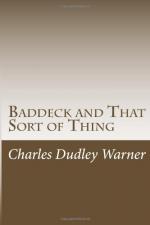It is still early, and one is beginning to be lulled by the frogs and the crickets, when the faint rattle of a drum is heard,—just a few preliminary taps. But the soul takes alarm, and well it may, for a roll follows, and then a rub-a-dub-dub, and the farmer’s boy who is handling the sticks and pounding the distended skin in a neighboring horse-shed begins to pour out his patriotism in that unending repetition of rub-a-dub-dub which is supposed to represent love of country in the young. When the boy is tired out and quits the field, the faithful watch-dog opens out upon the stilly night. He is the guardian of his master’s slumbers. The howls of the faithful creature are answered by barks and yelps from all the farmhouses for a mile around, and exceedingly poor barking it usually is, until all the serenity of the night is torn to shreds. This is, however, only the opening of the orchestra. The cocks wake up if there is the faintest moonshine and begin an antiphonal service between responsive barn-yards. It is not the clear clarion of chanticleer that is heard in the morn of English poetry, but a harsh chorus of cracked voices, hoarse and abortive attempts, squawks of young experimenters, and some indescribable thing besides, for I believe even the hens crow in these days. Distracting as all this is, however, happy is the man who does not hear a goat lamenting in the night. The goat is the most exasperating of the animal creation. He cries like a deserted baby, but he does it without any regularity. One can accustom himself to any expression of suffering that is regular. The annoyance of the goat is in the dreadful waiting for the uncertain sound of the next wavering bleat. It is the fearful expectation of that, mingled with the faint hope that the last was the last, that aggravates the tossing listener until he has murder in his heart. He longs for daylight, hoping that the voices of the night will then cease, and that sleep will come with the blessed morning. But he has forgotten the birds, who at the first streak of gray in the east have assembled in the trees near his chamber-window, and keep up for an hour the most rasping dissonance,—an orchestra in which each artist is tuning his instrument, setting it in a different key and to play a different tune: each bird recalls a different tune, and none sings “Annie Laurie,”—to pervert Bayard Taylor’s song.
Give us the quiet of a city on the night before a journey. As we mounted skyward in our hotel, and went to bed in a serene altitude, we congratulated ourselves upon a reposeful night. It began well. But as we sank into the first doze, we were startled by a sudden crash. Was it an earthquake, or another fire? Were the neighboring buildings all tumbling in upon us, or had a bomb fallen into the neighboring crockery-store? It was the suddenness of the onset that startled us, for we soon perceived that it began with the clash of cymbals, the pounding of drums, and the blaring of dreadful brass. It was somebody’s




